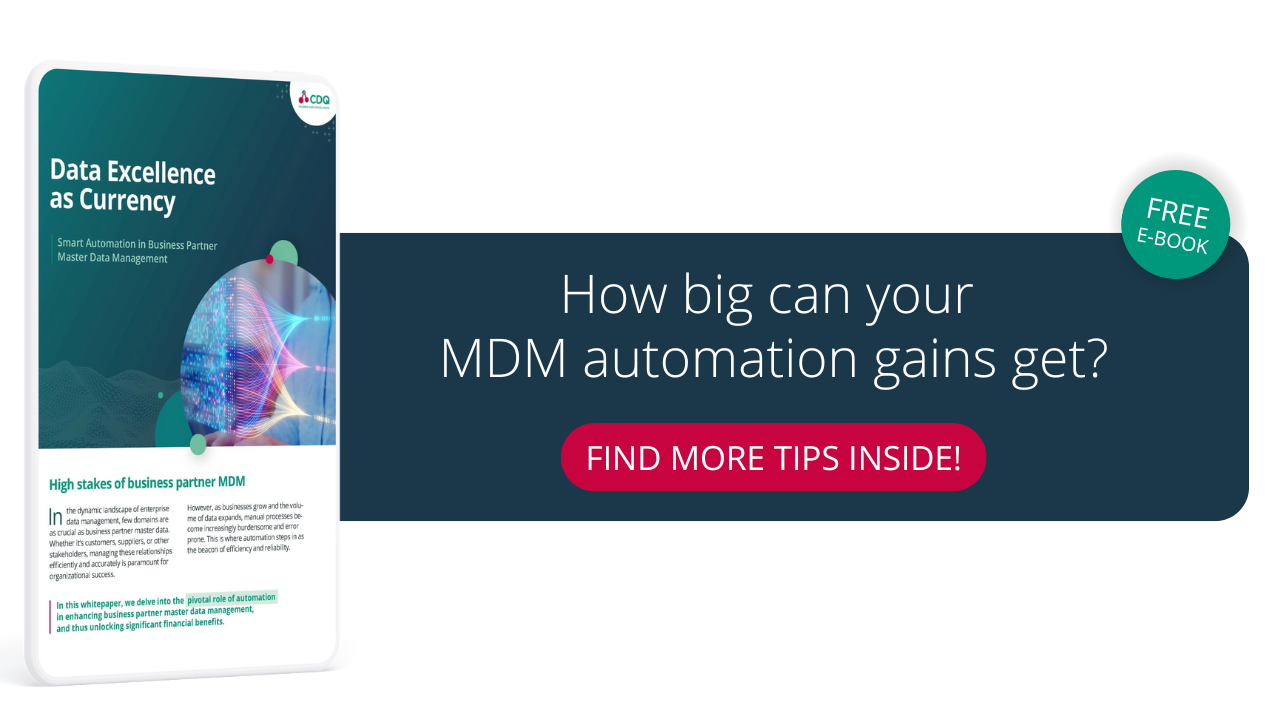Benefits of MDM automation: value beyond numbers

In the digital age, data is often referred to as gold - a precious asset that holds immense value for businesses. But like gold, data must be extracted and refined to unlock its true worth. Master data automation is one of those essential processes, transforming raw data into a valuable resource for informed decision-making, operational efficiency, and driving innovation.
While some benefits of master data automation can be measured - like increased speed of processing, improved compliance, and higher efficiency - there are other advantages that are less tangible but equally impactful.
When we think about the benefits of MDM automation, it’s easy to focus on the metrics: faster processing times, better compliance rates, and higher user trust. However, the true value of master data automation extends far beyond what can be quantified.
The intangible benefits - those hidden outcomes that are difficult to measure - can have profound, long-term effects on a business.
Boosting employee satisfaction
One of the most overlooked advantages of master data automation is its positive impact on employee satisfaction. By reducing the time and effort employees spend on repetitive tasks like data entry, verification, and correction, automation frees them up for more creative and value-added work. This shift not only increases productivity but also enhances job satisfaction. Employees gain more confidence in the accuracy and reliability of the data they work with, which reduces errors and builds trust in their daily operations. The result? A more engaged and satisfied workforce, which in turn drives better business outcomes.
Enhancing reputation management
In today’s hyper-connected world, reputation is everything. High-quality, automated master data plays a crucial role in maintaining and enhancing your business’s reputation. Consistent, accurate data enables you to deliver exceptional experiences to customers and suppliers, fostering loyalty and generating positive word-of-mouth. Moreover, it ensures compliance with legal and ethical standards, helping you avoid the pitfalls of fraud, sanctions, and regulatory issues. With robust data governance in place, you can demonstrate transparency and accountability, strengthening trust among stakeholders and setting your business apart in a crowded marketplace.
Elevating customer satisfaction
Customer satisfaction is the cornerstone of business success, and master data automation is key to achieving it. Accurate and reliable data allows you to deeply understand your customers—their needs, preferences, behaviors, and feedback. This understanding enables you to tailor your products and services to meet their expectations, creating a more personalized and relevant customer experience. Additionally, streamlined and automated data processes enhance your ability to respond quickly and effectively to customer inquiries and issues, further boosting satisfaction and loyalty.
Reducing carbon footprint
In an era where sustainability is a top priority, master data automation can also contribute to a greener business model. By eliminating duplicate records and optimizing data storage and retrieval processes, automation reduces the energy consumption of data centers. Moreover, accurate data about your business partners’ locations enables more efficient supply chain planning, which can significantly lower your organization’s carbon footprint. In this way, data quality and sustainability go hand in hand, helping your business achieve its environmental goals while also cutting costs.
Preparing for AI integration
As artificial intelligence (AI) becomes increasingly central to business operations, the importance of high-quality data cannot be overstated. Master data automation provides the foundation for successful AI initiatives, ensuring that the data feeding your AI systems is accurate, relevant, and free from bias. This reliable data supports better machine learning models, more insightful analytics, and ultimately, more effective automation across your business functions. By preparing your organization for AI, master data automation positions you to capitalize on the latest technological advancements and stay ahead of the competition.
Freeing up resources for strategic initiatives
One of the most significant, yet often unrecognized, benefits of master data automation is the ability to free up resources for more strategic initiatives. With automated data processes, your organization can reduce the resources allocated to data management and maintenance. This efficiency not only saves time and money but also allows you to redirect those resources toward innovation, strategic planning, and other high-value activities. In essence, automation empowers your business to focus on what truly matters—driving growth, innovation, and competitive advantage.
Value beyond numbers
While the measurable benefits of master data automation are clear, the intangible advantages are equally significant. From enhancing employee satisfaction and customer loyalty to improving sustainability and AI readiness, master data automation is a catalyst for transformation. By embracing automation, businesses can unlock new opportunities, optimize their operations, and build a foundation for sustained growth in an increasingly data-driven world.
Curious to learn more? Get in touch with us or dive deeper with our white paper.

Get our e-mail!
Related blogs
Master Data Management meets AI: work smarter, not harder
Let's be honest, master data management (MDM) often feels like a Sisyphean task. Wrangling inconsistent data, battling data decay, and striving for a single…
How AI and MDM work together to drive business success
In today's fast-paced world, Artificial Intelligence (AI) is becoming a must-have for making smart decisions, automating tasks, and discovering hidden insights.…
Trust, automation, and the future of master data management
Master data management (MDM) is a vital, albeit often underappreciated, foundation of modern business operations. When done right, it ensures smooth processes,…






